|
1 The morning I leave Oakland I wake at 5 am, and spend four hours finishing loading my truck. I check the mailbox one last time, and there's a package. A new book by my friend Christian McEwen, called World Enough and Time: On Creativity and Slowing Down. The perfect journey book for someone about to hurtle across a whole continent at 75 miles per hour.. I planned my departure so I could go to Rosh Hashana services at my beloved Kehilla Community. I will spend High Holy Days on the road, thinking, singing, experiencing the geography of the United States as I drive I-80 right across its middle. I park my loaded truck at the hall we rent for big services and go in, o immerse myself in song, bathe in prayers, dance to Ma Gadlu, receive blessings like a shower of petals from people I've gathered with for years, and sip the Rosh Hashana wine. Then I climb into my ten foot Budget truck and drive away. By the time the last errand is done, fog has started to settle over the Bay and the hills, that breathtaking play of light and moisture that defines the Bay Area sky, sun pouring through, glazing the blue fog with gold, then more fog rolling in, a white cottony blanket on the water, and pouring down off the hills, dimming the sun to a shimmer, and smelling of eucalyptus and ocean. I am wrenched with love for this place I am leaving. 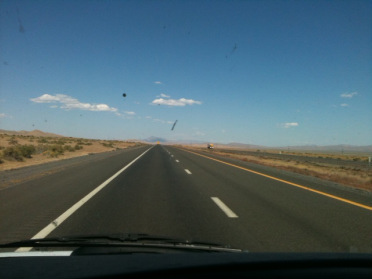 Once I cross the Carquines Bridge, I'm beyond the range of ordinary errands. The journey has begun. Golden hills, like plush upholstered furniture, or buzz-cut heads asleep on folded arms. Across the wide, flat, pesticide-drenched valley, into the foothills, racing against dusk, I must trust my memory of the directions, because tech troubles have deprived me of the mechanical voice of my GPS. It’s dark when I turn off I-80 onto Rt 89, toward South Lake Tahoe, and when at last I arrive at Meeks Bay, I can’t find my campsite, and need help to get the unwieldy length of the truck into the only empty site that seems feasible, without crashing into boulders. I have to borrow a flashlight and am feeling terribly incompetent, but my tent goes up easily and in half an hour I’m sound asleep. I wake at dawn and walk toward the new light, and there, only yards away, is Lake Tahoe, pearly blue, like pale glass poured round the bases of blue-grey mountains as flat as paper cutouts. Where water meets mountain is a band of deeper blue, like the dark rim of an old eye. I dip my cupped hands in the water and wash my face in its clear, clean coolness. 2 The theme of High Holy Days this year is the famous trio of questions posed centuries ago by Hillel: If I am not for myself, who will be for me? If I am only for myself, what am I? If not now, when? As I set off down the road from Lake Tahoe, through the Donner Pass and onto the high desert, I am singing them to my own tune, thinking about what it means to be "for myself" as a disabled and chronically ill person in a hyper-individualistic society that prizes self-reliance so highly. How to hold being responsible for myself, standing for myself, but not by myself. On my left, the Truckee River unwinds through steep, rocky valleys, dark blue water ruffled with whitecaps from the chunks of rock in its bed. It loops back and forth under the highway as the landscape opens up. Here is the high country and the longest day of my trip. I plan to cross Nevada and sleep in Salt Lake City. I also expect it to be boring. I remember Nevada as a uniform, endless brown, something to be gotten through. But Nevada makes me cry out "Oh, beauty!" The colors are pale yellow, a green the color of oxidized copper, silver grass, bone white earth, bright yellow flowering, sage green dotting the flat ground, and shades of tan and brown. The ancient ocean has never quite evaporated from these dry Western lands. There's something of sea bed, or coral reef, to the clumps of sage and tumbleweed, the long brown hills, the silver light. 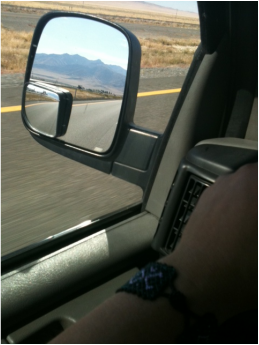 I stop for lunch in Lovelock, where years ago my daughter and I stayed at a motel full of heart decor. This time I find a tiny triangular park and set my solar oven on a picnic table, shining aluminum flaps open wide to catch the heat, while I sit in its shadow. I put soup on to heat, and open Christian's book. "Art is the means we have" I read" of undoing the damage of haste, " a quote from Theodore Roethke. The first chapter is about "hurry sickness," and I learn that in the Great Depression, people were healthier and lived longer, that the gift of unemployment was time. I'm reminded now of my Taino ancestors, whose tropical agricultural life allowed them to spend a day and a half a month on the cultivation of their staple crop, cassava, or yuca, and easy gathering and fishing for the rest, which allowed them to devote a lot of time to art. The Spanish couldn't understand why neither the promise of material gain nor the threat of punishment could get them to work harder than necessary. I eat my slow, solar lunch, fold the flaps of my oven and pack it away, and get back on the highway. 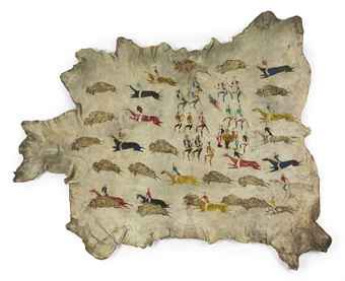 Wind River Shoshone Painted Elk Hide, depicting buffalo hunt. Shadows fly across the landscape, and a rising wind tosses tumbleweeds across my path. A distant bank of hills is scalloped with white, some streak of lighter rock, laid down in sediment millions of years ago, and no doubt a landmark for the people of this wide land for thousands of years. Western Shoshone? I think. Where does Paiute territory start? Into my head pops Robert Frost's famous poem, "Whose woods these are, I do not know. His house is in the village, though." I begin to compose, as clouds form and shift and race north, and the south wind thrusts against the flat sides of the truck, shaking and rattling it. Whose land this is I do not know. Their bones are in the landscape, though. Their names are spoken by the wind, though they were beggared long ago. Their gestures linger in the clouds, who once were here, and free and proud. If I could hear the whispered words, I'd call their names aloud. Late in the day the wind begins gusting harder, whipping a mixture of dust and fog across the road. For a while, I drive down a corridor of light, with dark clouds on either side, lightening forking down onto the hills, and a radiant, silver sheen behind me as the sun sinks. Glimpses in my rear view mirror make me gasp. Rays of gold shoot up and out, breaking through clouds and filling the heavens like a halleluyah moment. A minute later the cloud shifts and the sun becomes a baleful eye, heavy lidded, trailing lashes of rain that don't reach the ground. I am learning to navigate around immense trucks, their sheer metal walls create their own weather, rocking my little beetle of a trucklet as I grip the steering wheel and edge past them. If I'm going to keep to the speed limit and make the miles I need, I have to keep slipping by their sleek, rumbling masses of steel and diesel fumes. And now it's getting dark, and there is no way I'm going to make Salt Lake tonight. And not many places to camp in this part of Nevada. Motels are a hazard to me, the fumes of air fresheners, carpet cleansers, bathroom cleansers, laundry detergents and fabric softeners make them anything but havens. But I have to sleep, and there's nowhere else. The Motel 6 in Wells has a disability access room that isn't scented, but is musty, and mildew will make me ill in minutes, However, it also has an immense tiled bathroom, made for wheelchair access. I inflate my camp pad, unroll my sleeping bag, and sleep on the floor in there, while outside a grove of neon signs demand that passersby come in right this minute for a good time.
0 Comments
Your comment will be posted after it is approved.
Leave a Reply. |
About Aurora
Aurora Levins Morales is a disabled and chronically ill, community supported writer, historian, artist and activist. It takes a village to keep her blogs coming. To become part of the village it takes, donate here. Never miss a post!
Click below to add this blog to your favorite RSS reader: Archives
September 2017
Categories
All
|
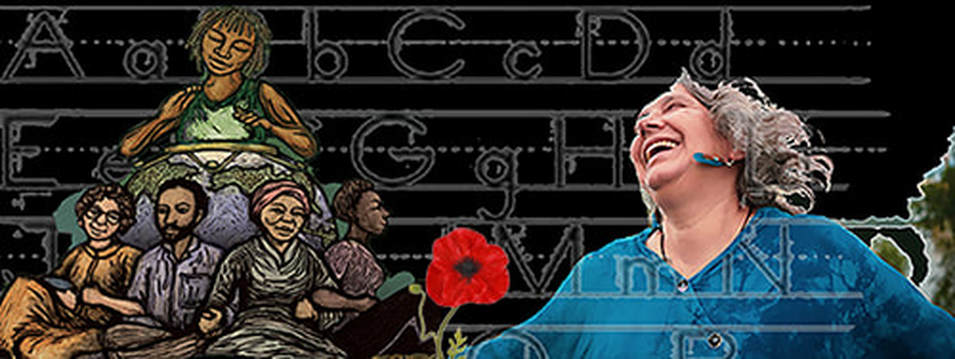
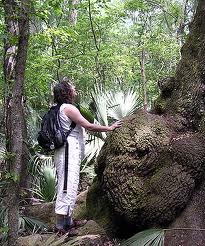
 RSS Feed
RSS Feed
